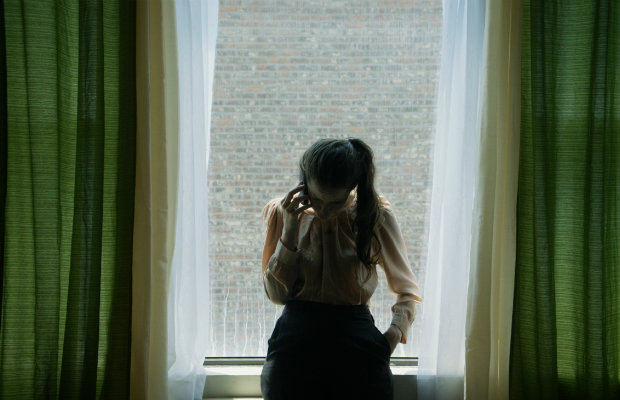Body Talk: Marquardt’s Debut Treads Lightly Through Provocative Territory
While majoring in social psychology, Ronah (Brooke Blum) takes on a small coterie of clients while working as a sex surrogate, referred to her though a therapist (Dennis Boutsikaris). She gets a new client, Johnny (Marc Menchaca), a rugged anesthetist’s assistant who has intimacy issues. He proves to be a difficult case, which may be why Ronah is drawn to him even from first sight. The more sessions they have, the more she finds herself thinking about him, which begins to change the way they interact.
Many seem to be confused by the notion of sex surrogacy and how this is different from something less socially acceptable, like prostitution. The 2012 film The Sessions from Ben Lewin addresses the concept for mainstream sensibilities (i.e. conservative sex-negative consumers), as even the change from its original title of The Surrogate indicates (yes, it’s based on a true story, but hardly sensitive to the viewpoint that plenty of non-handicapped people also have consulted sex surrogacy services). But Marquardt is not concerned with how this occupation works or doesn’t, and as far as the protagonist Ronah is concerned, she’s basically operating on the playing field of a cerebral, academic call girl. And many may feel disconnected from Ronah as a character, though she’s played superbly by Brooke Bloom, in a performance that only shows how ‘actressy’ Helen Hunt’s critically praised turn in The Sessions seems. For comparison’s sake, the film feels much more in line with Stacie Passon’s Concussion.
Ronah is that frustrating stereotype of students of psychology, seemingly purveying a field or avenue of interest in order so she can understand, perhaps, what’s wrong with herself. The film’s title and our narrative conditioning has us assuming that a predictable trajectory will take over once we’re introduced to the troubled Johnny, but this is a ruse—Ronah hasn’t ever had ‘control,’ at least as we’ve seen her from frame one. Her life outside of work is a series of uncontrollable sleights, and her interactions with her clients seem more appropriate for the subject she’s studying, because the mere thought of controlling or calibrating intimacy, desire, or passion is madness. And while there’s nothing surprising that’s really revealed to us about Ronah in particular, she’s an example of how blind we can be to our own paths of rationalization.
Marquand doesn’t really confirm where the film takes place, and it hardly matters, as the concern here is a woman so very isolated in every regard that it takes a moment of violence to force her into a sort of reevaluation. Without a familial support system (her rude brother sounds ridiculously crazy), related in a way that makes Ronah’s adult interactions quite believable, she’s a stunningly sympathetic character if one isn’t consumed by the frustrating and seeming superficiality of the narrative.
DoP Zack Galler catches gloomy exteriors and drained, muted interiors, and there’s an unsettling, uncomfortable aura to the film’s imagery, not unlike his work in 2014’s The Sleepwalker. Marc Menchaca’s Johnny is convincingly tense, but it’s Bloom who makes for the most interesting discovery here with an inward, closed off performance. Premiering at the Berlin Film Festival in 2014 and nominated at the Indie Spirit awards for Best First Feature and Best First Screenplay, She’s Lost Control is difficult to love because it realistically portrays a character who finds it difficult to love her own self.
★★★/☆☆☆☆☆
